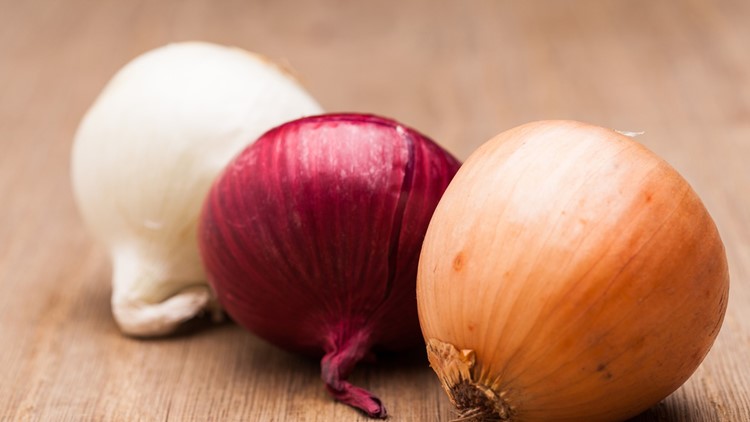HUNTSVILLE, Ala. — Almost 400 people in 34 states, including Tennessee and Florida, have been sickened in a Salmonella outbreak linked to onions. Most of the investigation is focused on red onions, but other types may be infected, too.
A formal recall has been announced for Thomson International Inc. of Bakersfield, California Red, Yellow, White, and Sweet Yellow Onions shipped from May 1, 2020 through the present.
The CDC announced July 31 that the outbreak is associated with onion types from Thompson International Inc. According to the FDA and CDC, they were sold in 5 lbs. carton. 10 lbs. carton. 25 lbs. carton. 40 lbs. carton, 50 lbs. carton. bulk, 2 lb. mesh sacks, and 3 lb. mesh sacks, 5 lb. mesh sacks, 10 lb. mesh sacks 25 lbs. mesh sacks, 50 lbs. mesh sacks under the brand names Thomson Premium, TLC Thomson International, Tender Loving Care, El Competitor, Hartley’s Best, Onions 52, Majestic, Imperial Fresh, Kroger, Utah Onions and Food Lion.
If you have any of these onions, throw them away. If you can’t tell where your onions are from, don’t eat them. Throw them away.
If you used onions to make any other food and don’t know where the onions were from, don’t eat the food. Throw it away, even if no one got sick.
If you are eating out and the location doesn't know where their onions are from, don’t buy the product. People sickened in this outbreak reported eating raw onions in freshly prepared foods, including salads, sandwiches, wraps, salsas, and dips.
At home, check your refrigerator and kitchen for any of these onions or fresh foods made with them.
- Check the package or look for a sticker on an onion to see if it is from Thomson International, Inc. If it is, don’t eat it. Throw it away.
- If you can’t tell where your onions are from, don’t eat them. Throw them away.
- If you made any foods with onions and you don’t know where they are from, do not eat them. Throw them away, even if no one got sick.
- Wash and sanitize any surfaces that may have come in contact with onions or their packaging, such as countertops, refrigerator drawers, knives, and cutting boards.
Below is a list of symptoms associated with Salmonella infection, as provided by the CDC:
- Most people infected with Salmonella develop diarrhea, fever, and stomach cramps 6 hours to 6 days after being exposed to the bacteria.
- The illness usually lasts 4 to 7 days, and most people recover without treatment.
- In some people, the illness may be so severe that the patient needs to be hospitalized. Salmonella infection may spread from the intestines to the bloodstream and then to other places in the body.
- Children younger than 5 years, adults 65 years and older, and people with weakened immune systems are more likely to have a severe illness.
Take these steps if you have symptoms of a Salmonella infection:
- Talk to your healthcare provider.
- Write down what you ate in the week before you started to get sick.
- Report your illness to your local health department.
- The health department will likely call you for an interview to ask you about foods you ate in the week before you got sick.
- Assist public health investigators by answering their questions when they contact you.



